Materiel Matters

Malaria in the Military: Protecting our Warfighters
By USAMMDA Public Affairs, published on 04/23/2021
Lace up your boots, grab your packs – it's time to deploy.
We are headed to somewhere tropical – it's going to be hot, the humidity will make your hair curl and the rainfall may not be as refreshing as you hoped.
You and your unit will be physically and mentally challenged. You will face many adversaries – some big and some small. But there is one adversary you may not have even considered – the mosquito.
Sure, you grabbed your bug repellent – your first line of defense – and your uniform covers most of your body, but you are still exposed, vulnerable to that pesky, blood sucking and potentially deadly insect.
Yes, deadly.
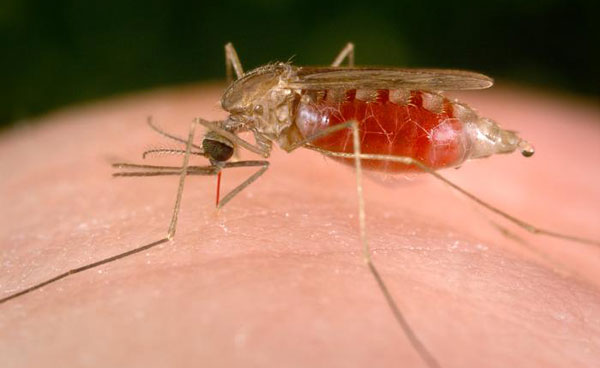
The Blood Buffet
Mosquitoes are just about everywhere – from your backyard barbeque to your vacation in the Caribbean, to your business trip in South Asia and a majority of the regions to where our military deploys.
At some point, you probably have been on the menu for these tiny predators. After all, your blood provides them with the nutrients to reproduce. Scary thought, right? Even scarier … Mosquitoes are the deadliest animal in the world, around a million lives are lost each year to the diseases transmitted by mosquitoes.
Many mosquito bites are relatively harmless, causing annoying, itchy bumps that can be easily treated with an over-the-counter anti-itch cream. However, others are much more deadly, carrying viruses or parasites that attack your body, making you really sick, and may often result in death.
Malaria is caused by one of these deadly parasites.
A Danger to Service Members and Travelers Alike
Malaria is found in tropical and subtropical parts of the world, where the climate is not only dependent on temperature but also the humidity and rainfall. These conditions allow the malaria-carrying mosquito to survive, multiply and complete their growth cycle.
Malaria is a serious tropical disease spread by mosquito bites. There are four types of malaria: Plasmodium falciparum, P. vivax, P. ovale, and P. malariae. Severe malaria is almost exclusively caused by the parasite, Plasmodium falciparum.
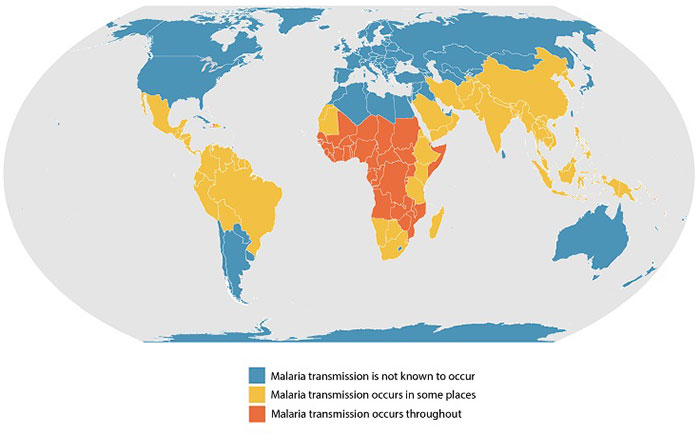
Ever had the flu?
When you are infected with malaria you experience a flu-like illness, high fever and shaking chills. You may find yourself hospitalized for treatment. Malaria is considered a medical emergency because it may rapidly cause complications, and severe cases may lead to death without prompt and appropriate treatment.
As a Service Member, if you become infected, you will be pulled from duty, whether at home or in a deployed status, for a prolonged recovery. You may have to be hospitalized, which could require evacuation from your duty station to a hospital for treatment, if severe.
This not only affects you but also the unit as a whole. Malaria is a threat to military operational readiness. It presents a logistical burden since full capabilities for prevention, definitive medical care and medical evacuation are required for operations in malaria-endemic areas. It is important to have treatment drugs for malaria if you do come down with the disease, as prophylactic drugs will not help cure you.
A single mosquito bite is all it takes for you to become infected.
Protecting Our Service Members from Malaria
The U.S. Army Medical Research and Development Command was established to understand the needs of the Warfighter, and to acquire off-the-shelf solutions or work with industry partners, like pharmaceutical companies, to develop medical solutions for all of the Services. There are times when Service Members need medical care or products to prevent and treat viruses and other conditions that don't affect most people in the U.S. This is where USAMRDC makes sure those needs are met.
For example, malaria is no longer found in the U.S., but it remains one of the most important infectious disease threats to Service Members deployed to tropical and subtropical regions. Service Members continue to be exposed to, and become infected with, this disease due to several factors:
- Deployments to threat areas
- Operational constraints
- Lack of compliance with currently available preventive measures
- Continuing emergence of drug-resistant malarial parasites
At the U.S. Army Medical Materiel Development Activity, there is a team of product managers that focus on the prevention and treatment of malaria. You can find these men and women within the Warfighter Protection and Acute Care Project Management Office. They manage Department of Defense resources that are applied to the advanced product development, licensure and fielding of pharmaceutical products for use by the U.S. Military, such as drugs and vaccines and prophylaxis. This team works closely with researchers at the Walter Reed Army Institute of Research and industry partners to ensure life-protecting and life-saving capabilities are discovered, tested and fielded.
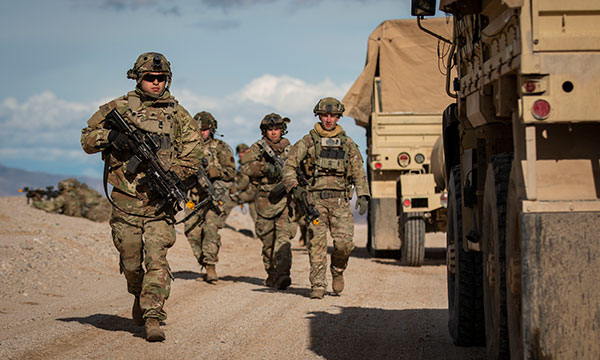
Prevention – Tafenoquine
Let's start with prevention.
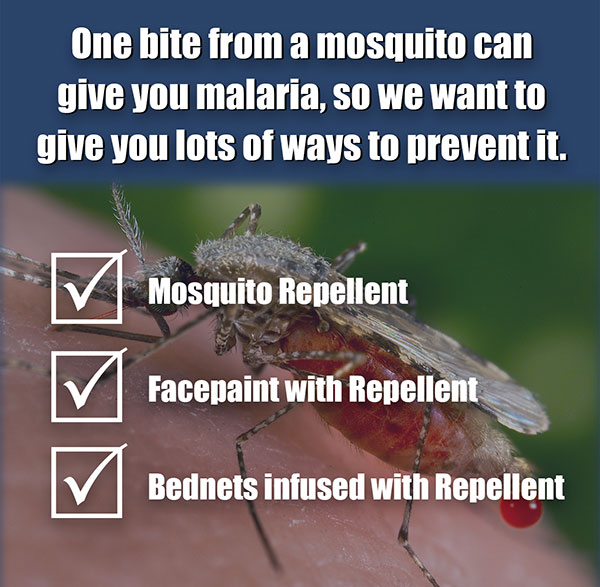
(Graphic by Jennifer Aggelis, USAMMDA public affairs)
Click here for PDF alternative.
In 2018, tafenoquine, the antimalarial drug known as Arakoda, received U.S. Food and Drug Administration approval for the prevention of malaria. Tafenoquine is a prophylaxis, meaning it is a preventative treatment taken prior to you potentially getting sick. True … mosquito repellent is a form of prophylaxis, but it is only a physical barrier that tries to keep the malaria parasite from getting into your body. But mosquitos can get past the physical barriers. Tafenoquine, as a drug prophylaxis, creates a chemical barrier within your body that kills the malaria parasite before it can cause the disease.
There are other malaria drugs on the market, each with its own benefits, but all have limitations. One limitation of most other antimalarial drugs is that you have to take them every day. If you accidentally skip a day or two, you could be at risk.
Tafenoquine, when prescribed by a doctor, is only taken once a week. That means fewer pills you have to remember to take, and you are protected for a longer period of time.
Another limitation of all the other drugs is that they don't prevent ALL types of malaria – we think of malaria as one disease, but it comes in a few forms. Other drugs don't prevent relapsing malaria from P. vivax or P. ovale – two types of parasites that can be dormant in your body and cause malaria later, even after you come home from deployment. Before, we would prevent this by having you take one antimalarial drug during deployment, then take a different drug, called primaquine, for 14 days after redeployment.
Tafenoquine is one drug that is long-acting and can kill all stages of the parasites in your body. As an FDA-approved drug, you can be confident that it is safe and effective.
Treatment – Intravenous Artesunate
How do you determine if you have malaria? By a blood test.
There are many prescription drugs available to treat mild to moderate cases of malaria. However, the treatment of severe malaria has required special authorization under an FDA emergency use protocol. That is, until recently.
In May 2020, Intravenous Artesunate, a malaria treatment drug, was approved by the FDA to treat severe malaria. Severe malaria occurs when the malaria infection becomes complicated by serious organ failure or abnormalities in the patient's blood or metabolism. Severe malaria is a medical emergency requiring urgent and aggressive treatment.
When IVAS is administered, it rapidly decreases the malaria parasites in the blood to allow a patient to recover sufficiently to take oral medications. IVAS is only administered with a diagnosis of severe malaria, in a hospital through an IV tube.
If you are diagnosed with severe malaria on one of your deployments, IVAS will be available. It will be strategically staged at military treatment facilities in malaria-present regions, as well as where Service Members are deployed. After a diagnosis of severe malaria in a deployed setting, IVAS will be administered by trained medical personnel in fixed military treatment facilities, known as Role of Care 4, as well as in field hospitals, known as Role of Care 3.
When treated properly, symptoms from severe malaria usually go away within a few days to a couple of weeks, depending on the severity of the illness.
Healthy Force = Ready Force
The DOD takes the health and safety of our Service Members very seriously, even against an adversary as small and deadly as the mosquito, as malaria remains one of the most significant infectious disease threats to our Service Members deployed overseas.
Tafenoquine as a prophylaxis, and IVAS as a treatment for severe malaria, are only part of the whole effort to diagnose, prevent and treat malaria.
Unit effectiveness, operational readiness, morale and general wellbeing all depend on how prepared we are to face whatever challenges cross our path.
So remember to start with your bug repellents, but be prepared to take your tafenoquine – and should you need it, IVAS will be available to you for treatment by military medical professionals.
Partners
The USAMMDA WPAC team works with USAMRDC and industry partners to develop and deliver quality medical products to protect, treat and sustain the health of our Service Members.
Tafenoquine was originally discovered by WRAIR and transitioned to USAMMDA. Tafenoquine (Arakoda) was developed in partnership with 60 Degrees Pharmaceuticals, which was established in 2010 to develop treatment and prevention medicines for tropical diseases.
Artesunate's initial development in the U.S. was led by a team of researchers from WRAIR. IVAS was transitioned to USAMMDA in 2009 for medical product development and management. USAMMDA assisted in the New Drug Application preparation, filing and review process, providing the clinical and other regulatory data required to support the New Drug Application submission and numerous FDA information requests. We have worked with AMIVAS LLC., a U.S., Australian and Canadian joint venture focused on the development, manufacturing and commercialization of therapeutics for the treatment of infectious diseases.
Contributors
Thank you to WPAC product managers Ryan Adams, Lindsey Garver and Danny Hassan for their contributions to this blog.

Materiel vs. Material – It's More Than a Typo
By USAMMDA Public Affairs, published on 01/30/2020
Whenever someone new begins a career with the U.S. Army Medical Materiel Development Activity, a subordinate command of the U.S. Army Medical Research and Development Command, they must quickly learn the difference between "materiel" and "material" – if they don't already know this, of course. The pronunciation is very similar, so this causes a problem for some, who may not have seen it in print beforehand. However, the team at USAMMDA is very familiar with these words, and their distinct definitions with regard to Army acquisition, and we'd like to share this information with our followers. [Read more...]

The Start of Something New
By Colonel Gina Adam, published on 12/03/2019
Hello, I'm COL Gina Adam, commander of the U.S. Army Medical Materiel Development Activity, located at Fort Detrick, Maryland. On behalf of USAMMDA, I'd like to welcome you to our new Command blog, Materiel Matters, which we intend to publish monthly for followers of our great organization! Although I will still continue writing the USAMMDA Commander's Blog for our command's staff members, this external blog will be geared towards providing timely, interesting and necessary information for our public followers. [Read more...]
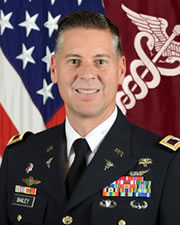
Thank You for Your Great Work!
By Colonel Ryan Bailey, published on 06/17/2019
I can't believe it's already been two years since I came to this great organization! It seems like only yesterday that I was taking the USAMMDA guidon from Col. Geesey during the Change of Command ceremony, and now we're only days away from the next ceremony, where I'll pass the guidon to your new USAMMDA commander, Col. Gina Adam. I'm most proud of the organization's accomplishments during a time of unprecedented change in the Army. We've successfully conducted multiple organizational transitions, as we've moved from being under the Army Medical Command, to the Army Materiel Command, and now to the Army Futures Command – all the while continuing to deliver critical products to our Warfighters. We've seen historical numbers for U.S. Food and Drug Administration approval of our products, including the anti-malarial drug Tafenoquine, the pain management drug Sufentanil, and the Laboratory Assay for Traumatic Brain Injury product, which is the first-ever blood-based test to detect instances of mild TBI. We've also moved a number of our products closer to the finish line as well, such as freeze-dried plasma, which can help save lives far forward on the battlefield. [Read more...]

Remembering Our Nation's Warfighters
By Colonel Ryan Bailey, published on 05/28/2019
I hope everyone had a wonderful Memorial Day weekend, and that you were able to enjoy quality time with family and friends. Most importantly, we all should take time to give thanks to those who served and gave the greatest sacrifice for our country. It's really important that we keep in mind our fallen warriors, not only on Memorial Day but all throughout the year. It's because of them, and all of our military Service Members, that we continue to live free in our great nation. And if you haven't been to Arlington National Cemetery, especially during the Memorial Day holiday, with all of the grave flags in place, you really should spend some time walking the grounds – it's truly an inspirational sight. [Read more...]

Military Appreciation and Honoring Inventors
By Colonel Ryan Bailey, published on 05/06/2019
Throughout May, our nation shows its appreciation of our military members serving throughout the world. However, May is also National Inventors Month, so within the U.S. Army Medical Research and Materiel Command and the U.S. Army Medical Materiel Development Activity, we have the unique opportunity to honor our Service Members that are part of critical product development groups. Our mission to create new medical capabilities that support the health of our military involves numerous partnerships with medical laboratories across the globe, as well as important transition agreements to make this happen. We work with our military labs within the USAMRMC, and other federal partners and industry, so it's truly a team effort to bring new technologies forward and have these transition quickly to the acquisition process for development. [Read more...]













